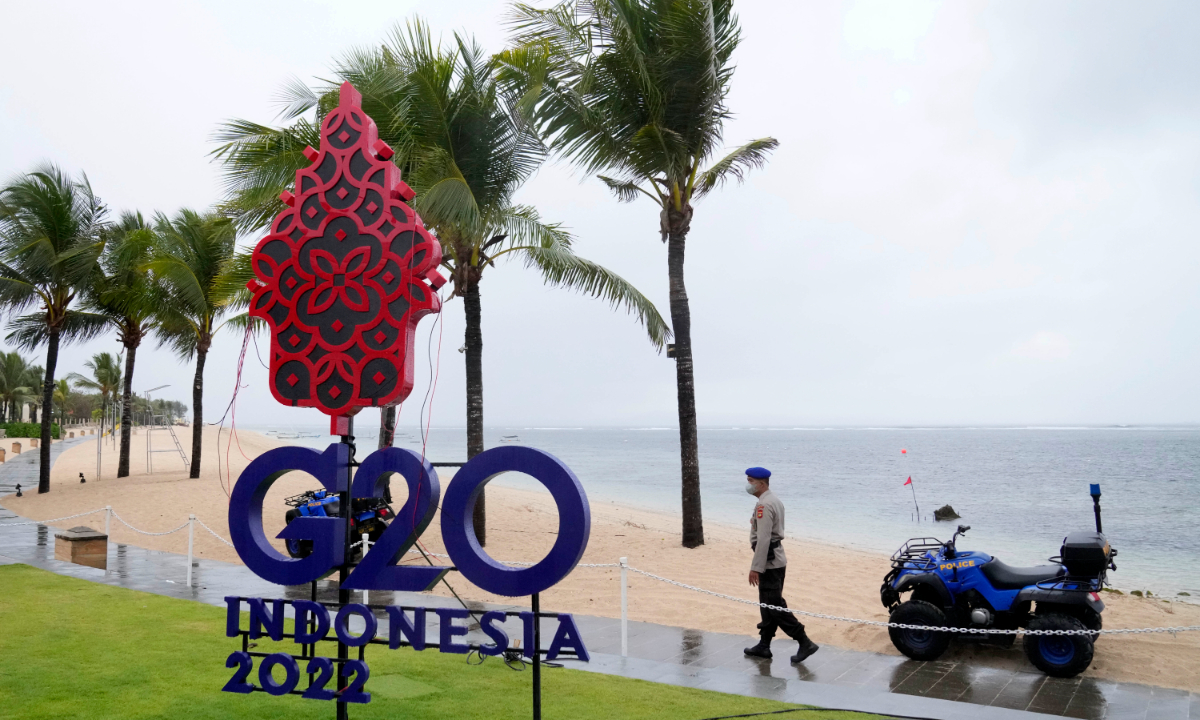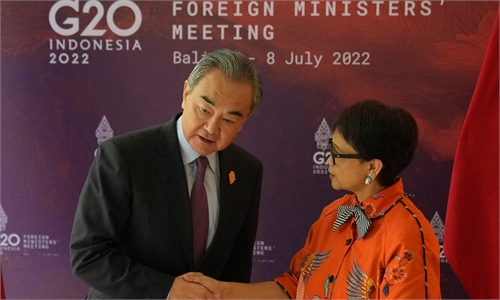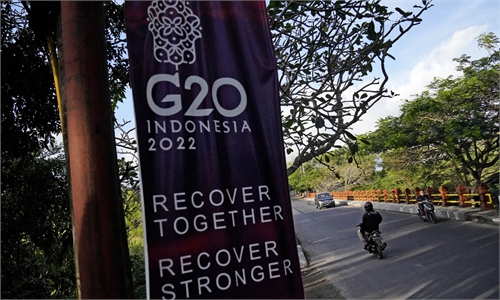
A police officer walks past a G20 sign in Nusa Dua, Bali, Indonesia, Thursday, July 7, 2022. Foreign ministers from the Group of 20 leading rich and developing nations are gathering in Indonesia's resort island of Bali for talks. Photo: VCG?
For the first time in two decades, the US dollar is equal to the euro in value, The Washington Post reported on Wednesday. As Europe grapples with growing recession fears and the fallout from the Russia-Ukraine conflict, analysts warned the euro's tumble to parity against the dollar could have major impacts on the European and global economies.
The US dollar's recent rally on steep Fed rate hike bets is putting pressure on central banks and currencies of a majority of economies. Besides the euro, which is closely affected by the Russia-Ukraine conflict and the US-led sanctions against Russia, the Japanese yen and British pound are also losing terrain against the US dollar.
The strong dollar will undoubtedly bring severe impacts to the economy of European region and other developed countries, but the bigger problem with the strengthening of the dollar now is that it may lead to a cascading debt crisis in emerging economies.
The managing director of the International Monetary Fund warned on Tuesday that "there is a growing risk of a debt crisis" amid the COVID-19 pandemic, tightening monetary policy and the rising cost of servicing debt in US dollars, according to media reports. Some 30 percent of developing and emerging markets, and 60 percent of low-income countries, are at or near debt distress, the IMF chief added.
As early as January this year, the IMF warned that global debt reached a record $226 trillion, with the highest annual increase since World War II in 2020. A global debt storm may be imminent. In addition to Sri Lanka, which is deeply in debt crisis, according to media reports, since April, Peru, Egypt and Tunisia have all experienced domestic turmoil caused by soaring food and energy prices.
Given the dominance of the dollar in the global financial system, its rally will make it more difficult for businesses and households in many economies outside the US to obtain financing. Global financial conditions tighten further as the dollar goes up, putting pressure on a wide range of emerging markets, especially those that are weaker.
When it comes to the debt issue, the first thing the international community discusses is to have an aid mechanism, which is of course necessary. But what is more critical is to find out where this debt crisis comes from. This wave of global debt is certainly partly caused by the COVID-19 pandemic, but more importantly, the root cause is the US-led sanctions against Russia, which caused hikes in food and energy prices fanning inflation in many economies.
Therefore, the reason why the current global debt crisis continues to deteriorate is that the US and its allies are taking the escalation of sanctions against Russia as their top priority. Unless this approach is changed, the global debt crisis is not expected to be resolved soon.
For Europe, its current predicament lies in multiple factors. Many observers believe that the US-led NATO's adherence to cold war thinking and its continued eastward expansion are some of the reasons for the intensification of the Russia-Ukraine conflict. Europe is actually paying for the US' strategy. The US should not let European countries, let alone the vast number of developing countries, bear the consequences of this looming crisis.
In order to prevent the global economy be dragged into a disaster, major economies should conduct policy communication and coordination in the spirit of mutual respect and benefit. The G7 mechanism has been proven to be unable to reflect the spirit of the times and incapable of gathering global efforts to deal with crises. The G20 mechanism should play key role to coordinate efforts to turn the current situation around.
The author is an editor with the Global Times. bizopinion@globaltimes.com.cn


